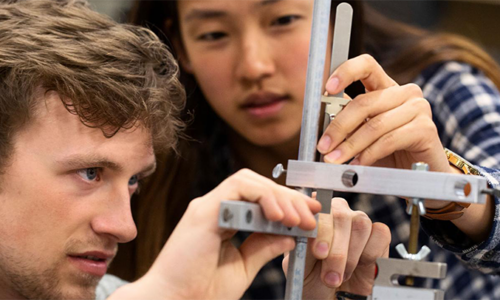Keywords: quantum physics, condensed matter physics, quantum simulation, atomic physics
Recommendation: This is a project designed for students who have a background in quantum physics, solid-state physics, and numerical simulation. Knowledge in the basic ideas of performing quantum simulation with atom/molecule/ion systems is preferred but not required. This project is recommended for students who want to develop their career in the fields of condensed matter physics, and atomic, molecular and optical physics.
Introduction:
Many-body physics, which studies the strongly interacting quantum particles, is at the frontier of many fields, including condensed matter physics and high energy physics. Due to the complexity of many-body systems, many phenomena observed experimentally still do not have a fully satisfactory explanation (one famous example is the puzzle related to high-temperature superconductivity).
Because the dimension of the Hilbert space scales exponentially with the number of quantum particles involved, solving these many-body problems numerically is beyond the capacity of classical computers. One approach that can overcome such challenges was suggested by Richard Feynman. The idea is to build up a well-controlled synthetic quantum system in the lab that simulates the many-body system that we are interested in. Often known as “quantum emulator”, such synthetic quantum system provides a promising platform to investigate puzzles in many-body physics, due to the precise control over parameters and the freedom to engineer the corresponding Hamiltonian.
During the past decades, significant progress has been made in doing quantum simulations with experimental platforms based on atom/molecule/ion systems. The ingredients to engineer the Hamiltonian that the synthetic quantum system can simulate include light-matter interactions, strong interactions between atoms or molecules, and the control over external magnetic and/or electric fields. To further
harness the power of quantum simulation, it is crucial to develop new and experimental feasible protocols that can be used to realize the models we are interested in.
The goal of this project is to develop new protocols for atomic systems that can be implemented to simulate quantum phenomena in condensed matter physics and high- energy physics. We will work on new methods to do Hamiltonian engineering that can simulate quantum materials, and performing numerical simulation on the experimental
1/2observables. Potential problems of interest include, but are not limited to: Floquet physics, thermalization of out-of-equilibrium systems, quantum phase transitions, and topological physics.
Requirements:
Knowledge in quantum physics, solid-state physics, and basic programming skills are required for participating in this program. Advanced knowledge in many-body physics, field theory, and atomic physics is preferred. If not, the corresponding background knowledge related to quantum simulation with atomic systems will be introduced briefly during the program, and the students are encouraged to explore more on related topics.
This program is better for senior undergraduate students or graduate students. Students are strongly encouraged to propose their ideas during this program.
Course Features
- Lectures 1
- Quizzes 1
- Duration 10 weeks
- Skill level All levels
- Language English
- Students 6
- Assessments Yes



